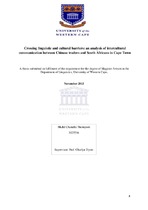| dc.description.abstract | In recent years South Africa has seen a significant growth in the number of migrants entering its borders. The country has opened its doors to not only migrants from the African continent, but also to immigrants from the People’s Republic of China (PRC) and the Indian subcontinent. The increasing number of Chinese businesses in South Africa means that South Africans are now coming into fairly regular contact with Chinese people from mainland China. This study addresses the issue of intercultural communication between Chinese store
keepers and South African customers and seeks to investigate the ways in which the two juxtaposed cultures communicate effectively despite linguistic and cultural barriers. As a study on intercultural communication, the theoretical framework for this is globalisation, with a particular focus on concepts like intercultural communication, politeness and face theory. The study adopts a qualitative research design with an ethnographic methodological approach to examine and describe the linguistic practices of Chinese and South Africans in the city of Cape Town when they interact in the business contexts. The study relies largely on interviews
with Chinese business owners and their South African clients, as well as observation of the interaction between these two groups. The research population consists of 8 Chinese interviewees, random interviews with 4 customers and 4 shop assistants, and observation at stores in a local China Town (a collection of Chinese shops and businesses). For research purposes and for the sake of informed consent, a Chinese research assistant and translator assisted the principal researcher. The major tool for analysis is a content analysis of the transcribed interviews. From these transcribed interviews, I describe the strategies used for
effective intercultural communication between the two groups, and aim to draw conclusions on how these strategies have enabled Chinese businesses to flourish in Cape Town. | en_US |

